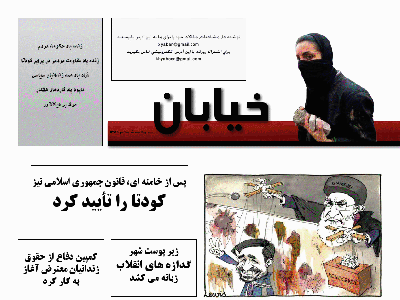 Khyaboon, (meaning ‘street’) is one of underground internet journals that emerged in Iran after the June presidential election and subsequent systematic repression of protesters.
Khyaboon, (meaning ‘street’) is one of underground internet journals that emerged in Iran after the June presidential election and subsequent systematic repression of protesters.
Khyaboon displays the dynamism of citizen media and the diversity of Iran's protest movement.
This journal, that is distributed directly to your email inbox in PDF format, is against the Iranian regime but also criticizes reformists from time to time.
Khyaboon answers our questions about its goal, function, Iranian citizen media, and who their target audience is.
Q: Why and when was Khyaboon first published and who was your target audience?
The first issue of Khyaboon was published on the 19th of June [one week after the presidential election] before [the Islamic Republic Leader] Khamenei’s speech where he ordered repression against the people. At first Khayboon was published daily for a month, and since then it usually gets published once every two weeks. Khyaboon has been available in hard copy and has also been sent to email inboxes. So far there have been 48 issues.
Our audience is all of the public, but we pay special attention to the part of society that is engaged in the street struggle. We publish guidelines and articles regarding protesting, including articles for internet security protection, facing tear gas, social confronting torture, and so on. Our audience are the same people who are in the streets, the citizens who fight in the street and society, they are people who have been jailed, tortured and killed
Our news and analysis topics concern ordinary people in streets: their destiny, their voice, pain and bravery. These people do not get attention in mass media except coincidentally. We are trying to take back the media from the Ayatollahs and professional politicians, making it more accessible to workers, women, students, and all oppressed people. We are a publication from within society and for society, and not for a submissive one.
Invisible and Safe
Q: Why you do not have any website or blog?
Firstly, government filtering is the number one enemy for websites criticizing the authorities. Each attempt from our side will quickly be faced by their filtering. Instead we concentrate our efforts in an area that the government cannot attack. The second concern is security related. We are not internet security specialists and prefer to minimize security risks. A few months ago Revolutionary Guards announced that they were arresting several people with alleged connections to certain websites. The regime calls these sites ‘immoral’.
It seems that security forces have capacities for repression in the virtual world that are unknown to us. If we work in a centralized manner, even in virtual world, our communications could be come compromised and our colleagues’ lives could be endangered for what they write. Our invisibility and our non-centralized presence are helpful to our safety, although threats always still exist.
Q: Another publication Kalam Sabz is the voice of reformists whose voice are you?
In Iran there is always difference between the surface and depth of the society. You are facing in public and official places see a different kind of social life than non official places. In Iran women wear a kind of cloth in official places and wear differently in home or non official places. Reformists until a few months ago were a part of establishment and had their own parties, publishing their own journals and organized their institutions. They took part in establishment and had their own word to say but in the depth of society there are citizens who were repressed and voiceless. Kalam Sabz is the protest of society’s surface and Khyaboon want to be the voice of depth of society.
Citizen/reporter/protester
Q: How you evaluate the impact of social networking such as Twitter on the protest movement?
Social networking and citizen media are the fruit of protests against the dictatorship. Submitting before a dictator means the absence of citizens’ voices and social atomization. Dictatorships struggle to isolate people from distributed social networking. In a dictatorship a citizen has no voice and no media. Only rulers have the voice and they have the exclusivity to broadcast news.
In Iran, the Islamic Republic did its best to destroy any association. The Islamic Republic’s favorite citizen is the one who lives alone, goes to work each morning and is lost in traffic jams and metro crowds, before coming back home at night. The Islamic Republic’s favorite citizen is not a member of any association, syndicate, and has neither media nor a voice.
But a citizen who fights a dictator will organize him/herself, create social networks and find a voice. At least in Iran the reporter/citizen is not a precise word, an appropriate word is reporter/citizen/protester. Before the election, citizen media mostly belonged to students, women, and labour activists, who were on the frontlines of the struggle. But today, at the heart of mass struggle all protesters have become citizen/reporters/protesters.
A citizen who comes to the streets to protest the dictatorship and films it with his mobile phone is no longer the lonely human being of yesterday. In other words, social networking does not create today’s protests, but is the fruits of our struggle. The struggle of a society against an inhumane regime. Without struggle, these modern technologies can even be of service to the regime. But when a society fights for its life, internet including Twitter, Facebook, emails and other tools are used by citizens. For example we do not need big publishing houses for Khyaboon, and we can distribute it safer by email than on paper. But without human beings to use them for the richness of their social life, these technological tools are meaningless.







4 comments
Having a website is easy in .onion land, use Tor and setup a hidden service. https://www.torproject.org/docs/tor-hidden-service
We hear you in unexpected places. In the name of Neda, may thousands of flowers bloom.